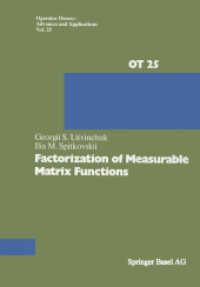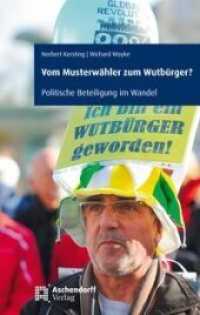- ホーム
- > 洋書
- > 英文書
- > Literary Criticism
Full Description
Dislocation and the need for radical reorientation are central experiences in 20th-century German history. Much of German culture has also consisted of reflections on and responses to the historical caesurae of 1933, 1945 and 1989-90, and the massive political, social and economic changes that accompanied them. In the first instance, dislocation and reorientation are to be understood in the physical sense, i.e. the loss of their homes in Germany, Austria and Czechoslovakia by Jewish and Communist émigrés after 1933, by Germans in Eastern Europe after 1945, and by disaffected individuals leaving the GDR for the West between 1949 and 1989. But they are also ideological, social and cultural experiences.
This volume seeks to explore the parallels and differences between the impact on these groups of their sense of loss and their struggle to establish new identities after major upheavals. What their diverse experiences have in common is the sense of social and intellectual dislocation, even amongst those whose physical location did not change for long periods of time. Drawing on the ideas of various social and cultural theorists, and adopting a variety of approaches, our contributors examine how not only dislocation but also reorientation has been articulated, both in political discourse and across the cultural spectrum from fiction to life writing, from poetry to film.
Contents
Axel GOODBODY, Pól Ó DOCHARTAIGH, Dennis TATE: Introduction
Volker BRAUN: Aus: Machwerk oder Das Schichtbuch des Flick von Lauchhammer
Anna CHIARLONI: A polso teso. Portrait der Poesie Volker Brauns
Axel GOODBODY: Political dislocation and poetic reorientation in Volker Braun's Bodenloser Satz
Karen LEEDER: 'Totentänze': Volker Braun's late poems - Postscripts on the end of utopia
Gerd LABROISSE: Überlegungen zu Volker Brauns Rede zur Verleihung des Schiller-Gedächtnispreises 1992: 'Ist das unser Himmel? Ist das unsre Hölle?'
Daniel AZUÉLOS: Die deutschsprachige Exilpresse und das Attentat des 20. Juli 1944
Geoffrey V. DAVIS: 'The fog of peace and war': German exiles in postcolonial Anglophone writing
Wolfgang EMMERICH: Odradek - ein Bewohner des Dritten Raums. Mit Franz Kafka unterwegs zu transkulturellen Lektüren
Helen FEHERVARY: Kipling and others: Literary allusions in Anna Seghers's 'Die schönsten Sagen vom Räuber Woynok'
Peter HUTCHINSON: Stefan Heym's exile poetry as the foundation for his later fiction
Hamish RITCHIE: Kurt Schwitters in Ambleside
Gisela HOLFTER: Ein Fallbeispiel zur Rückkehrproblematik aus dem Exil - Ernst Lewy (1881-1966)
Deborah VIETOR-ENGLÄNDER: Résistance, Restauration und deutsch-jüdische West-Remigranten: Alfred Kantorowiczs Schauspiel Die Verbündeten in der DDR
Ian CONNOR: German expellees in the SBZ/GDR and the Oder-Neisse 'peace border'
Peter BARKER: Dislocation and reorientation in the Sorbian community (1945-2008)
Dennis TATE: Von der Fröhlichkeit im Schrecken: Fred Wander's celebration of dislocation
Mike DENNIS: A people's game: Football in the German Democratic Republic
Peter THOMPSON: Heimatlos zu Hause: Bloch, Žižek and the dislocated Heimat
Dieter SEGERT: Ausreisen und Ausflüge - Geschichten aus dem letzten Jahr der DDR
Roger WOODS: Retold lives: East German autobiography after East Germany
Gerrit-Jan BERENDSE: Verlust der Mitte: Wolf Biermanns Abnabelung von seinem Topos Berlin
Christine COSENTINO: Ingo Schulze's Handy. Thirteen Tales in the Old Style: Another look at East(ern) Germanness and identity formation
Stuart PARKES: 'Home soured home?' Dislocation as a motif in the works of Martin Walser
Colin B. GRANT: Without a name: Kurt Drawert and the dislocated self
Gert-Joachim GLAEßNER: Westernisation, Europeanisation, and civil society: Has Thomas Mann's vision of a European Germany come true?
Ian Wallace Bibliography
Index of Contributors








